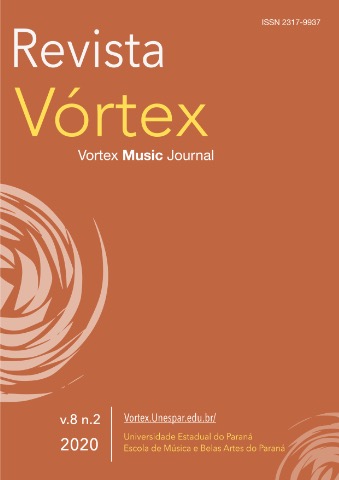On the nature of musical scores and the rationale to prepare them: formulating directives
DOI:
https://doi.org/10.33871/23179937.2020.8.2.8Keywords:
musical scores, music hermeneutics, music writingAbstract
This paper investigates the nature of written musical scores and their role in the communication between composer and performer. Using as thread the narrative of the rewriting of a problematic earlier score, the investigation starts from Derrida's emphasis of absence in the phenomenon of writing (1982) and Eco's concept of model reader (1979), and stresses the importance of improvisation in the creative process and its impact in the act of writing, introducing a notion of hermeneutics from Barthes' distinction between Work and Text (1977), Bloom's concept of poetic misprision (1975), and Austin's theory of speech-acts (1962), which is used to create an interpretative tripartite model. There is then a discussion on the purely abstract nature of a composition and the pitfalls involved in the task of transcribing performances. During the course of the discussion, the rationale investigated engenders twelve directives for the effective preparation of musical scores.
Downloads
References
AROM, Simha. African Polyphony and Polyrhythm: Musical Structure and Methodology. Cam- bridge: Cambridge University Press, 1991.
AUBRY, Pierre. Trouveres et Troubadours. Paris: Felix Alcan, 1909.
AUSTIN, J. L.. How to Do Things with Words. Oxford: Clarendon Press, 1962.
BAILEY, Derek. Improvisation: Its Nature and Practice in Music. New York: Da Capo, 1992.
BARTHES, Roland. Image - Music - Text. London: Fontana Press, 1977.
BENT, Margaret. "Resfacta" and "Cantare Super Librum". Journal of the American Musicological Society, University of California Press, Vol. 36, No. 3 (Autumn, 1983), p. 371-391, 1983.
BITTENCOURT, Marcus Alessi (composer). Malédiction (1st ed.). New York: Vultur gryphus (author's editions), 2001. Musical score, for piano and automated live electronics.
BITTENCOURT, Marcus Alessi. Doctor Frankenstein, I Presume ... or The Art of Vivisection. 2003. Doctoral Dissertation (Doctor of Musical Arts). Graduate School of Arts and Sciences, Co- lumbia University in the City of New York, New York, USA.
BITTENCOURT, Marcus Alessi (composer). Malédiction (2nd revised ed.). Maringá: Vultur gryphus (author's editions), 2020. Musical score, for piano and automated live electronics.
BLACKING, John. Problems of Pitch, Pattern and Harmony in the Ocarina Music of the Venda. African Music, International Library of African Music, Vol. 2, No. 2, p. 15-23, 1959.
BLOOM, Harold. The Anxiety of Influence: a theory of poetry. New York: Oxford University Press, 1973.
BLOOM, Harold. The Necessity Of Misreading. The Georgia Review, University of Georgia, Vol. 29, No. 2 (Summer), p. 267-288, 1975.
BRÄ‚ILOIU, Constantin. "Le folklore musical". In: Musica aeterna. Zurich: Metz, 1949, p. 277- 332.
BUSONI, Ferruccio. Sketch of a New Esthetic of Music. New York: G. Schirmer, 1911. CARDEW, Cornelius. Towards an Ethic of Improvisation. In: "Treatise Handbook", London:
Edition Peters, 1971, pp. xvii-xx.
CHOPIN, Frédéric (composer). Quatre Mazurkas, Op.17 (1st edition). Paris: Maurice Schlesinger, 1834.
DERRIDA, Jacques. "Signature Event Context". In: DERRIDA, Jacques. Margins of Philosophy. Chicago: The University of Chicago Press, 1982, p. 307-30.
ECO, Umberto. The Role of the Reader: Explorations in the Semiotics of Texts. Bloomington: Indi- ana University Press, 1979.
ECO, Umberto. The Open Work. Cambridge, Massachusetts: Harvard University Press, 1989.
ESTREICHER, Zygmunt. Une technique de transcription de la musique exotique (Expériences pratiques). In: Bibliothèques et Musées de la Ville de Neuchâtel (Rapport), 1956, Neuchatel, 1957, p. 67-92.
FERAND, Ernest T.. What Is "Res Facta"? Journal of the American Musicological Society, Univer- sity of California Press, Vol. 10, No. 3 (Autumn), pp. 141-150, 1957.
HEDLEY, Arthur; BROWN, J. E.; TEMPERLEY, Nicholas; MICHALOWSKI, Kornel. "Fry- deryk Chopin". In: SADIE, Stanley (editor). The New Grove Dictionary of Music and Musicians, 6th ed.. London: Macmillan Publishers Ltd., 1980, vol. 4, p. 292.
JAKOBSON, Roman. Language in Literature. Cambridge: Harvard University Press, 1987. NETTL, Bruno. Theory and Method in Ethnomusicology. New York: Collier-Macmillan Publish-
ers, 1964.
NETTL, Bruno. Thoughts on Improvisation: A Comparative Approach. The Musical Quarterly. Oxford: Oxford University Press, Vol. 60, No. 1 (January), pp. 1-19, 1974.
SCHAEFFER, Pierre. Treatise on Musical Objects: An Essay across Disciplines (translated by Chris- tine North and John Dack). Oakland: University of California Press, 2017.
THORESEN, Lasse; HEDMAN, A. "Spectromorphological analysis of sound objects: an adapta- tion of Pierre Schaeffer"™s typomorphology." Organised Sound, v. 12, issue 02 (August): pp. 129- 141, 2007.
ULBANERE, Alexandre. Willy Corrêa de Oliveira: por um ouvir materialista histórico. 2005. Dis- sertation (Master's Degree). Universidade Estadual Paulista - UNESP, Instituto de Artes, São Paulo, Brazil.
ZIMMERMANN, Jens. Hermeneutics: A Very Short Introduction. Oxford: Oxford University Press, 2015.
Downloads
Published
How to Cite
Issue
Section
License
Copyright (c) 2021 Marcus Alessi Bittencourt

This work is licensed under a Creative Commons Attribution 4.0 International License.
Autores mantêm os direitos autorais e concedem à revista o direito de primeira publicação, com o trabalho simultaneamente licenciado sob a Licença Creative Commons Attribution que permite o compartilhamento do trabalho com reconhecimento da autoria e publicação inicial nesta revista.






